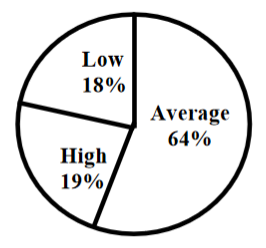An analysis on the study habits among undergraduate medical students
Abstract
Introduction: Study habits is one important factor which influences the academic performance of students. The learning strategies of high achievers are likely to be more effective. The study was aimed to analyse the study habits among undergraduate medical students and compare the study habits of high, average and low achieving undergraduate medical students. Application of effective learning strategies may be helpful in achieving better academic outcomes.
Materials and Methods: The study was conducted as a cross sectional, observational study with 118 Final year MBBS students as study participants using Dennis Congos Study Skills Inventory Questionnaire consisting of 51 study habits questions classified according to domains of Text Book reading, Notes taking, Memory, Test Preparation, Concentration, Time management.
Results: The percentage of students scoring above the cut off levels in each domain were: Memory: 61/118 (51.69%), Concentration: 67/118 (56.77%), Notes taking: 7/118 (5.93%), Time management: 17/118 (14.40%), Test preparation: 31/118 (26.27%), Text book reading: 35/118 (29.66%). The only Study habit that showed significant difference across the high, medium and low achievers was: Ability to pay attention in the class (p: 0.006).
Conclusion: Though the students are talented and fare better in Memory and Concentration skills, there is glaring lack of attitudinal skills like Notes taking, Time management, Test preparation and Textbook reading skills. Paying attention in the class seems to be one most important distinguishing learning strategy determining the academic performance. Teaching– Learning methodologies need to be made more interesting so as to actively engage the attention of low achievers also.
Downloads
References
Mandal A, Ghosh A, Sengupta G, Bera T, Das N,Mukherjee S. Factors affecting the performance of undergraduate medicalstudents: A perspective. Indian J Community Med. 2012;37(2):126-129. doi: https://dx.doi.org/10.4103%2F0970-0218.96104.
Arulampalam W, Naylor R, Smith J. Factors affecting the probability of first year medical student dropout in the UK: a logistic analysis for the intake cohorts of 1980-92. Med Educ. 2004;38(5):492-503. doi: https://doi.org/10.1046/j.1365-2929.2004.01815.x.
Cepeda NJ, Vul E, Rohrer D, Wixted JT, Pashler H. Spacing effects in learning: a temporal ridgeline of optimal retention. Psychol Sci. 2008;19(11):1095-1102. doi: https://doi.org/10.1111%2Fj.1467-9280.2008.02209.x.
Karpicke JD, Roediger HL 3rd. The critical importance of retrieval for learning. Sci. 2008;319(5865):966-968. doi: https://doi.org/10.1126/science.1152408.
Carpenter SK, Wilford MM, Kornell N, Mullaney KM. Appearances can be deceiving: instructor fluency increases perceptions of learning without increasing actual learning. Psychon Bull Rev. 2013;20(6):13501356. doi: https://doi.org/10.3758/s13423-013-0442-z.
Liew SC, Sidhu J, Barua A. The relationship between learning preferences (styles and approaches) and learning outcomes among pre-clinical undergraduate medical students. BMC Med Educ. 2015;15:44. doi: https://doi.org/10.1186/s12909-015-0327-0.
Lerchenfeldt S, Nyland R. Learning technique utility and preferences among second-year medical students: a pilot study of general and pre-exam study habits. MedEd Publish. 2016;5. doi: https://doi.org/10.15694/mep.2016.000096.
Ward PJ. First year medical students' approaches to study and their outcomes in a gross anatomy course. Clin Anat. 2011;24(1):120-127. doi: https://doi.org/10.1002/ca.21071.
Siahi EA, Maiyo JK. Study of the relationship between study habits and academic achievement of students: A case of Spicer Higher Secondary School, India. Int J Edu Admin Pol Stud. 2015;7(7):134-141. doi: https://doi.org/10.5897/IJEAPS2015.0404.
Nonis SA, Hudson GI. Performance of College Students: Impact of Study Time and Study Habits. J Edu Business. 2010;85(4):229-238. doi: https://doi.org/10.1080/08832320903449550.
Cebeci S, Dane S, Kaya M, Yigitoglu R. Medical students’ Approaches to Learning and Study Skills. Procedia - Soc Behav Sci. 2013;93:732-736. doi: https://doi.org/10.1016/j.sbspro.2013.09.271.
Siddiqui IA, Abdulrahman KAB, Mohammed A. A learning skills course for the 1st year medical students: an experience at a Saudi medical school. Advan Med Edu Prac. 2015;6: 205-210. doi: https://dx.doi.org/10.2147%2FAMEP.S77717.
Weinstein CE, Ridley DS, Dahl T, Weber ES. Helping students develop strategies for effective learning. Edu Leader. 1989; 46(4):17-19.
Nyland RL, Sawarynski KE1. Setting Students Up for Success: A Short Interactive Workshop Designed to Increase Effective Study Habits. MedEd Portal. 2017 ;13:10610. doi: https://dx.doi.org/10.15766%2Fmep_2374-8265.10610.
Naqvi S, Chikwa G, Menon U, Al Kharusi D. Study skills assessment among undergraduate students at a private university college in Oman. Med J Soc Sci. 2018;9(2):139-147. doi: 10.2478/mjss-2018-003.
Wernersbach BM, Crowley SL, Bates SC, Rosenthal C. Study Skills Course Impact on Academic Self-Efficacy. J Develop Edu. 2014;37(2):14.
Blythman, Margo and Orr, Susan (2002) A joined up policy approach to student support. In: Failing Students in Higher Education. Open University Press, Buckingham. Available from: http://ualresearchonline.arts.ac.uk/id/eprint/7378.
Joshi AS, Ganjiwale JD, Varma J, Singh P, Modi JN, Singh T. Qualitative Assessment of Learning Strategies among Medical Students Using Focus Group Discussions and In-depth Interviews. Int J Appl Basic Med Res. 2017;7(1):S33-S37. doi: https://dx.doi.org/10.4103%2Fijabmr.IJABMR_144_17.
Reid WA, Duvall E, Evans P. Can we influence medical students' approaches to learning? Med Teach. 2005;27(5):401-407. doi: https://doi.org/10.1080/01421590500136410
Madhavi S, Naidu AS, Krishnaveni A, Kiran P. Study Skills assessment among Medical Undergraduates–Where they stand. IOSR-JDMS. 2014;13(10):16-19.
Jiraporncharoen W, Angkurawaranon C, Chockjamsai M, Deesomchok A, Euathrongchit J. Learning styles and academic achievement among undergraduate medical students in Thailand. J Educ Eval Health Prof. 2015;12:38. doi: https://dx.doi.org/10.3352%2Fjeehp.2015.12.38. eCollection 2015.
Raja C. Bandaranayake. Oxford Textbook of Medical Education. Oxford University Press. 2013 Oct.
Yip M, Chung O. Relationship of Study Strategies and Academic Performance in Different Learning Phases of Higher Education in Hong Kong. Edu Res Eval. 2005;11(1):61-70. doi: https://doi.org/10.1080/13803610500110414.
Cynthia J. Miller. Implementation of a study skills program for entering at-risk medical students. Advan Physiol Edu. 2014;38(3): 229-234. doi: https://doi.org/10.1152/advan.00022.2014.
Mendezabal MJN. Study Habits and Attitudes: The Road to Academic Success. Open Science Repository Education. Online (Open-access). 2013;e70081928. doi: http://dx.doi.org/10.7392/Education.70081928.
Nagaraj C, Pradeep BS. Why do medical students under-perform? A cross-sectional study from Kempe Gowda Institute of Medical Sciences, Bangalore. J Dr. NTR Univers Health Sci. 2014;3(2):92-96. doi: http://www.jdrntruhs.org/text.asp?2014/3/2/92/134841.
Nourian A, Mousavinasab SN, Fehri A, Mohammadzadeh A, Mohammadi J. Evaluation of study skills and habits in medical students. South East Asian J Med Educat. 2008;2(1):61-64.
Ahmad HN, Asif M. Medical students’ learning habits: A mixed method study during clinical rotation in general surgery. J Paki Med Assoc. 2018;68(4):600606.
Shanmukananda P, L Padma, Identifying learning techniques among high achievers. Int J Basic Clinic Pharmacol. 2013;2(2):203-207.doi: https://doi.org/10.5455/2319-2003.ijbcp20130316.



 OAI - Open Archives Initiative
OAI - Open Archives Initiative


